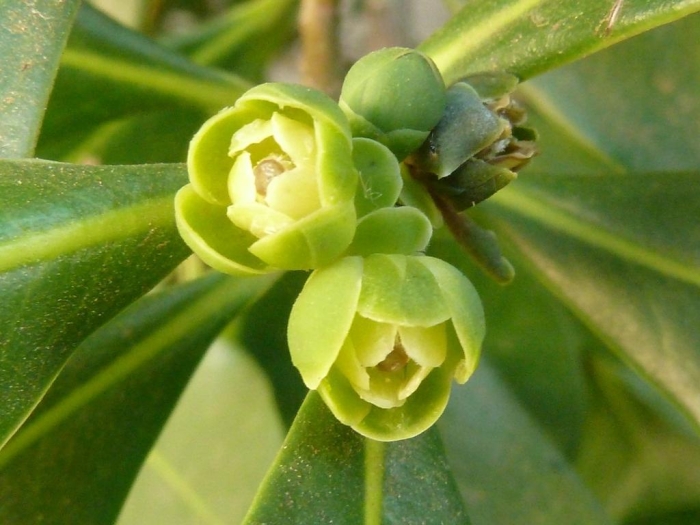Pepper-Bark Tree
(Warburgia salutaris)
Pepper-Bark Tree (Warburgia salutaris)
/
/

© M Kriek
CC BY-SA 4.0
Image By:
© M Kriek
Recorded By:
Copyright:
CC BY-SA 4.0
Copyright Notice:
Photo by: © M Kriek | License Type: CC BY-SA 4.0 | License URL: http://creativecommons.org/licenses/by-sa/4.0/ | Uploader: mkriek | Publisher: iNaturalist |























Estimated Native Range
Summary
Warburgia salutaris, commonly known as the pepper-bark tree, is a deciduous tree native to a variety of woodland and forest habitats, including miombo woodlands, riverine forests, and evergreen forests in eastern and southern African countries such as Botswana, Namibia, Kenya, Tanzania, Zambia, Mozambique, South Africa, Eswatini, Malawi, and Zimbabwe. It typically grows up to 33 feet (10 meters) in height and is known for its aromatic, shiny green leaves. The tree produces inconspicuous yellow-green flowers, which are followed by purple or black leathery berries that are notable for their medicinal properties. The flowering season occurs from September to November, and while the flowers are not particularly showy, the tree is valued for its attractive foliage and bark.
The pepper-bark tree is renowned for its medicinal uses, particularly in traditional African medicine. The Maasai people use it to treat malaria and respiratory complaints. In cultivation, it can serve as an ornamental tree or be grown for its medicinal bark. It requires a well-drained soil, moderate watering, and can tolerate a range of light conditions from full sun to partial shade. However, it is important to note that the tree is threatened in its natural habitat due to overharvesting for its medicinal bark and habitat loss. Gardeners who wish to grow Warburgia salutaris should be mindful of its conservation status and obtain plants from reputable sources that do not contribute to wild population decline.CC BY-SA 4.0
The pepper-bark tree is renowned for its medicinal uses, particularly in traditional African medicine. The Maasai people use it to treat malaria and respiratory complaints. In cultivation, it can serve as an ornamental tree or be grown for its medicinal bark. It requires a well-drained soil, moderate watering, and can tolerate a range of light conditions from full sun to partial shade. However, it is important to note that the tree is threatened in its natural habitat due to overharvesting for its medicinal bark and habitat loss. Gardeners who wish to grow Warburgia salutaris should be mindful of its conservation status and obtain plants from reputable sources that do not contribute to wild population decline.CC BY-SA 4.0
Plant Description
- Plant Type: Tree
- Height: 20-50 feet
- Width: 10-20 feet
- Growth Rate: Moderate
- Flower Color: Cream, Green
- Flowering Season: Summer
- Leaf Retention: Evergreen
Growth Requirements
- Sun: Full Sun, Part Shade
- Water: Medium
- Drainage: Medium, Fast
Common Uses
Bee Garden, Bird Garden, Drought Tolerant, Edible*Disclaimer: Easyscape's listed plant edibility is for informational use. Always verify the safety and proper identification of any plant before consumption., Low Maintenance
Natural Habitat
Woodland and forest habitats, including miombo woodlands, riverine forests, and evergreen forests
Other Names
Common Names: Pepperwood, African Pepper
Scientific Names: , Warburgia salutaris, Chibaca salutaris, Warburgia breyeri,
GBIF Accepted Name: